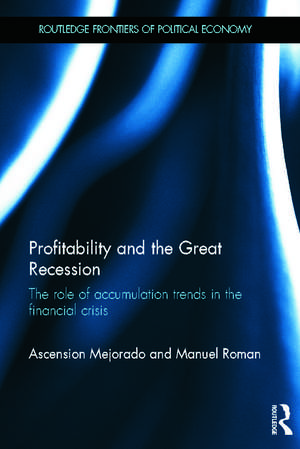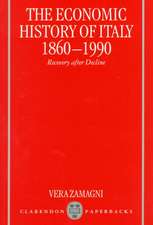Profitability and the Great Recession: The Role of Accumulation Trends in the Financial Crisis: Routledge Frontiers of Political Economy
Autor Ascension Mejorado, Manuel Romanen Limba Engleză Hardback – 21 oct 2013
Drawing on insights from Adam Smith, David Ricardo, John Stuart Mill and Karl Marx, the authors interpret the relationship between capital accumulation and profitability trends through the conceptual lens of classical political economy. The book provides extensive empirical evidence of declining rates of US non-financial corporate accumulations from the mid-1960s and profitability trends in that sector falling from post-war highs. In contrast to this, it is shown that there was a vigorous rise of profitability in the financial sector from a 1982 trough to the early part of the twenty-first century, which led to the bloating of that sector. The authors conclude that the long-term falling accumulation trend in the non-financial corporate sector, highlighted by the bankruptcy of major automobile corporations, stands out as the underlying force that transformed the financial crisis into a fully-fledged Great Recession.
This book will be of interest to students and researchers in the areas of economics, political economy, business and finance.
| Toate formatele și edițiile | Preț | Express |
|---|---|---|
| Paperback (1) | 350.73 lei 6-8 săpt. | |
| Taylor & Francis – 9 dec 2016 | 350.73 lei 6-8 săpt. | |
| Hardback (1) | 712.83 lei 6-8 săpt. | |
| Taylor & Francis – 21 oct 2013 | 712.83 lei 6-8 săpt. |
Din seria Routledge Frontiers of Political Economy
-
 Preț: 309.90 lei
Preț: 309.90 lei -
 Preț: 309.79 lei
Preț: 309.79 lei -
 Preț: 316.03 lei
Preț: 316.03 lei -
 Preț: 152.66 lei
Preț: 152.66 lei - 9%
 Preț: 867.54 lei
Preț: 867.54 lei -
 Preț: 151.96 lei
Preț: 151.96 lei -
 Preț: 311.61 lei
Preț: 311.61 lei -
 Preț: 286.98 lei
Preț: 286.98 lei -
 Preț: 327.83 lei
Preț: 327.83 lei - 9%
 Preț: 1005.48 lei
Preț: 1005.48 lei -
 Preț: 325.09 lei
Preț: 325.09 lei - 9%
 Preț: 938.47 lei
Preț: 938.47 lei -
 Preț: 386.11 lei
Preț: 386.11 lei -
 Preț: 324.87 lei
Preț: 324.87 lei -
 Preț: 310.95 lei
Preț: 310.95 lei -
 Preț: 318.54 lei
Preț: 318.54 lei -
 Preț: 317.95 lei
Preț: 317.95 lei -
 Preț: 310.01 lei
Preț: 310.01 lei -
 Preț: 326.49 lei
Preț: 326.49 lei -
 Preț: 155.43 lei
Preț: 155.43 lei -
 Preț: 309.79 lei
Preț: 309.79 lei -
 Preț: 328.76 lei
Preț: 328.76 lei -
 Preț: 281.72 lei
Preț: 281.72 lei -
 Preț: 286.58 lei
Preț: 286.58 lei -
 Preț: 371.95 lei
Preț: 371.95 lei -
 Preț: 353.77 lei
Preț: 353.77 lei -
 Preț: 310.55 lei
Preț: 310.55 lei -
 Preț: 302.75 lei
Preț: 302.75 lei -
 Preț: 312.86 lei
Preț: 312.86 lei -
 Preț: 374.16 lei
Preț: 374.16 lei -
 Preț: 329.09 lei
Preț: 329.09 lei -
 Preț: 348.21 lei
Preț: 348.21 lei - 28%
 Preț: 1047.06 lei
Preț: 1047.06 lei - 18%
 Preț: 1169.45 lei
Preț: 1169.45 lei - 18%
 Preț: 1555.17 lei
Preț: 1555.17 lei - 18%
 Preț: 1048.43 lei
Preț: 1048.43 lei - 18%
 Preț: 1059.84 lei
Preț: 1059.84 lei - 31%
 Preț: 767.47 lei
Preț: 767.47 lei - 18%
 Preț: 731.92 lei
Preț: 731.92 lei - 26%
 Preț: 822.54 lei
Preț: 822.54 lei - 18%
 Preț: 1796.21 lei
Preț: 1796.21 lei - 26%
 Preț: 1184.91 lei
Preț: 1184.91 lei - 18%
 Preț: 1120.23 lei
Preț: 1120.23 lei - 15%
 Preț: 700.95 lei
Preț: 700.95 lei - 18%
 Preț: 1116.31 lei
Preț: 1116.31 lei - 22%
 Preț: 299.52 lei
Preț: 299.52 lei - 18%
 Preț: 999.46 lei
Preț: 999.46 lei - 18%
 Preț: 1169.78 lei
Preț: 1169.78 lei
Preț: 712.83 lei
Preț vechi: 869.31 lei
-18% Nou
Puncte Express: 1069
Preț estimativ în valută:
136.40€ • 142.79$ • 112.86£
136.40€ • 142.79$ • 112.86£
Carte tipărită la comandă
Livrare economică 05-19 aprilie
Preluare comenzi: 021 569.72.76
Specificații
ISBN-13: 9780415709934
ISBN-10: 0415709938
Pagini: 344
Ilustrații: 79 Line drawings, black and white; 5 Tables, black and white; 79 Illustrations, black and white
Dimensiuni: 156 x 234 x 26 mm
Greutate: 0.8 kg
Ediția:New.
Editura: Taylor & Francis
Colecția Routledge
Seria Routledge Frontiers of Political Economy
Locul publicării:Oxford, United Kingdom
ISBN-10: 0415709938
Pagini: 344
Ilustrații: 79 Line drawings, black and white; 5 Tables, black and white; 79 Illustrations, black and white
Dimensiuni: 156 x 234 x 26 mm
Greutate: 0.8 kg
Ediția:New.
Editura: Taylor & Francis
Colecția Routledge
Seria Routledge Frontiers of Political Economy
Locul publicării:Oxford, United Kingdom
Public țintă
Postgraduate and UndergraduateCuprins
1. Introduction 2. Kaldor’s ‘Stylized Facts’: Real or merely convenient 3. Innovations as Competitive Weapons 4. Mechanization and Price/Quality Competition 5. Capital Intensity and Profitability: Dissenting views 6. Heterodox Models of Technical Change and Profitability 7. Capital-Output Ratios in Retrospect 8. Profitability Trends After the ‘Golden Age’ 9. Profit-Driven Capital Accumulation Rate in OECD Countries 10. Nonfinancial Versus Financial Profitability Trends and Capacity Utilization 11. Mill and Minsky on Roads to Speculation and Crisis 12. Unemployment Trends Beyond the Great Recession 13. Sources and Methods
Notă biografică
Ascension Mejorado is Master Teacher of Economics at New York University, USA.
Manuel Roman taught economics at New Jersey City University, USA for over 25 years, and is now retired.
Manuel Roman taught economics at New Jersey City University, USA for over 25 years, and is now retired.
Descriere
This book presents an analysis of systemic trends in profitability and capital accumulation in the US and other major OECD countries leading up to the Great Recession of 2008. The authors conclude that the long-term falling accumulation trend in the non-financial corporate sector, highlighted by the bankruptcy of major automobile corporations, stands out as the underlying force that transformed the financial crisis into a fully-fledged Great Recession.













